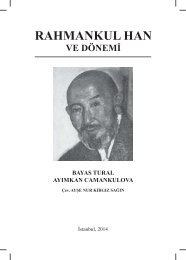THE SOVIET HISTORIOGRAPHY AND THE QUESTION OF KAZAKHSTAN’S HISTORY
SOVYET-TARIH-YAZICILIGI-ENG
SOVYET-TARIH-YAZICILIGI-ENG
Create successful ePaper yourself
Turn your PDF publications into a flip-book with our unique Google optimized e-Paper software.
170<br />
<strong>THE</strong> <strong>SOVIET</strong> <strong>HISTORIOGRAPHY</strong> <strong>AND</strong><br />
the past as well. If a leader claimed that an event happened a specific<br />
way, that determined its interpretation. If a leader concluded that two<br />
plus two equaled five, it was the historian’s work to make it so. 301<br />
These facts reveal that historians were not permitted objectivity<br />
during the scientific research process. Historians analyze the events<br />
from the documents, but when it comes to evaluation of the analysis,<br />
they extend to the boundaries that the ideology set for them. 302<br />
Naturally, there were some valuable written pieces even under<br />
these circumstances. The research methodologies that authors used<br />
meant abandoning topics about the recent past, or getting away from<br />
the center, and working on narrow subjects. 303<br />
Finally, a Soviet historian had to document in the references that<br />
he/she used some sources directly about the ideology.<br />
6. The language of the historian<br />
Another aspect that historian should be careful about was the<br />
literary language of the work. The literary language was crucial to<br />
show the scientific level of the piece, the understandability of the<br />
piece for the reader and the historian. And, it was crucial that during<br />
all three phases of the research: the literature review, the literature<br />
used, and the writing period. The language of the historian meant the<br />
alphabet that he used during the writing of the work and the language<br />
historian used in the writing: the terminology.<br />
Since the 1940s, after the alphabet confusion that occurred in the<br />
first years of the Soviet Union, the Russian language and the Cyrillic<br />
alphabet moved to the forefront in the work of Soviet historians. It<br />
is possible to speak of history writing and education in a national<br />
language in the newly formed Republics of the Union, notably evident<br />
that in the infusion of the Russian language at all levels as an effective<br />
state language. It was not possible to expand languages beyond<br />
35 minutes. I fnished my speech 45 second early. Stalin looked at his watch and<br />
said “well done”. See: Polyakov, p. 155.<br />
301 Хорхординa, Т. И., “Архивы и тотaлитaризм (Опыт срaвнительно-исторического<br />
aнaлизa)”, Отечественнaя история, Moscow 1994. No: 6, p. 148.<br />
302 This situation was confessed by Polyakov after the Soviet period. “I would really like that,<br />
the people who grow up in a different period could understand the past 50 years. Everybody<br />
in the institute knew that we had to follow the party’s directives. Historians were working<br />
really objectively, science was improving. But when it comes to politics, everybody<br />
had to support the soviet ideology and must work in the boundries that the party had set<br />
for us…” See:“ Институт истории полстолетия нaзaд, p. 130.<br />
303 Ağayev, ibid, p. 154.



